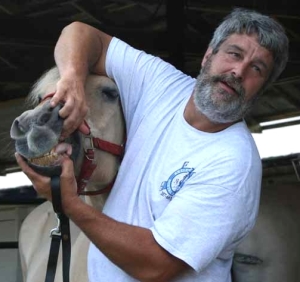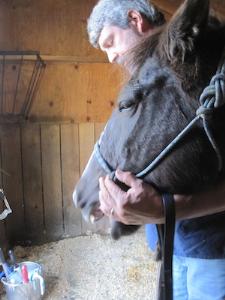 I visited with Steve Akeley the other day. He’s is a talented horseman as well as one of Maine’s most popular equine dentists.
I visited with Steve Akeley the other day. He’s is a talented horseman as well as one of Maine’s most popular equine dentists.
Steve floated my horses’ teeth for years. Always thorough. Always professional. Always willing to take the extra time horses often need during procedures. He travels with a cute, lively Jack Russell terrier riding shotgun. They make quite a pair as Steve has a lumberjack build with a full beard to match.
He shared that he was headed to Texas for some continuing education at the Texas Institute of Equine Dentistry, run by Randy Riedinger.
Riedinger is arguably the most accomplished equine dentists in the country. He perfected a method of molar extraction and developed the Riedinger Procedure, an internationally accepted method for correcting parrot mouth in young horses.
In Maine and elsewhere, there are two options for giving your horse proper equine care: a vet or an equine dentist.
- Vets will argue that anyone providing equine medical care should be one of them. They say equine dentists don’t know enough veterinary medicine to do the job.
- Equine dentists argue that when it comes to teeth, vets train less, practice less, and are generally less qualified to do the job.
 Martin Black wrote about his preference for equine dentists here.
Martin Black wrote about his preference for equine dentists here.
In the last several years, state governments and veterinarian associations have tried to strip equine dentists of their right to practice and force horse owners to hire only vets. Thankfully, they’ve had minimal success. Read more about it here.
A few years ago in Texas, the court ruled that the Texas State Board of Veterinary Medical Examiners broke the law when they tried to restrict equine dentistry.
As with anything, it pays to do your homework, get recommendations, and check references. Consider this post a Thumbs Up for Mr. Akeley.
Steve has been our equine dentist for several years now. Not only is he gentle, efficient and patient with every horse he encounters, he notices the little things. Last year, he informed us of a problem with our mare’s mouth. Her front teeth were not straight across and her molars did not meet properly. Furthermore, her poop contained larger than preferred segments of hay: a sign her teeth were not doing their job properly. Steve took the time to acknowledge these points and provide a picture of how it effects the horse and of course, a plan of action.
It should be added that equine dentistry can be disastrous for your horse and it is a decision that should not be taken without education and care! An equine dentist that is not skilled can remove too much enamel causing severe proprioception and TMJ issues in horses. Just this week during my clinic I worked with two horses whose dental grind was non-existent. Both of these horses presented with rearing over backward issues…decisive proprioception issues likely caused by the same dentist who floated both teeth…not Mr. Ackeley. It pays to do the homework. I don’t float yearly as recommened…but AS NEEDED. A good dentist will tell you when floating is necessary and does not use power tools. Here is a great article for readers to consider and use for their own education at their discretion. http://www.ivcjournal.com/articles/equine-dentistry/ –
Great thoughts, Karina. Thanks for the link!
My parents have horses that they have to pay close attention to. One of their horses needs to get it wolf teeth taken out. Removing a tooth on a horse seems like it would be a difficult job so I wonder how that process would work. http://horizonequine.net/Services.html